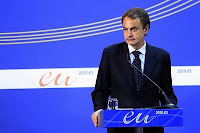Spain Financial Crisis and Measures:Increasing taxes
Jose Luis Rodriguez Zapatero, the prime minister, on Wednesday outlined a series of measures that will include a suspension in automatic increases to retirement pensions, a drop in overseas aid an d a reduction in government investment.
d a reduction in government investment.
He said 13,000 civil service jobs would be cut in 2010, with public sector wages frozen in 2011.
Mr Zapatero was fleshing out the details of a €15bn plan announced on Sunday for deeper spending cuts to reduce Spain's deficit from 11.2pc of GDP last year to 9.3pc in 2010, and eventually to 3pc in 2013.
Spain eased out of recession with 0.1 percent growth in first quarter compared to the preceeding quarter, the government statistics' office said in a preliminary report Wednesday.
Regional governments will also be asked to make €1.2bn in savings from their budgets and the Spanish Cabinet would vote on cuts and 2011 budget spending on Friday, he said.
Core eurozone government bond futures turned negative in response to the plan with markets giving it a cautious thumbs-up.
Spain, Europe's fifth largest economy, entered its recession in the second quarter of 2008 as the global financial meltdown compounded a crisis in the Spanish property market, which had been a major driver for growth in the preceding years.
The economy continued to contract until the fourth quarter of 2009 when it shrank 0.1pc, according to the statistics office.
Spain is the last major world economy to emerge from recession.
- France's economy grew 0.1pc in the first quarter of 2010, the smallest rise in a year amid stagnant consumer spending, according to preliminary figures released Wednesday by the state statistics agency. The previous three quarters had been marked by a gradual rise from France's worst recession since the Second World War.
Measures:
The Government is reported to be looking at increasing taxes on high earners. Deputy Prime Minister, María Teresa Fernández de la Vega, said on Tuesday that nothing was being ruled out, and that the Government could call for a greater effort from ‘those who have most capacity’.
In the face of continuing confusion as to what is happening to pensions she also said that they would not be frozen until 2012, saying pensioners would get more in 2011 than in 2010. Here she called for calm from the citizens saying that pensions are not being cut, but would stay as they are and their purchasing power would be maintained. The Prime Minister has also launched a similar message.
De la Vega also called for ‘responsibility’ form Previous Prime Minister, José María Aznar, following his article on Monday in the Financial Times where he analysed Spain’s economic situation. The Deputy Prime Minister said he was making claims which did not help or support.
Minister for Tax and the Economy, Elena Salgado, has said that she thinks the European Commission will approve the new austerity plan presented by the Spanish Government. She said she does not think the EU executive will request for any more tax rises in Spain. EU finance ministers are meeting today in Brussels.
One of the first decisions from the ECOFIN meeting today has been, despite opposition from Britain, to strengthen the controls on hedge funds. 80% of European hedge funds are placed in London.
Concerning news for the Spanish Treasury, which has failed to reach the forecast minimum sale in the latest bond auction. On offer were bonds over 12 and 18 months offering an interest rate of 2,05% or 1.69%, 80% higher than in previous offers. 6.43 billion was sold, while the objective was to sell between 6.5 and 7.5 billion.
The OCU consumers’ union has said they found 523 faults in 193 journeys taken by taxis, and have concluded that things have not improved in the sector since their last study in 2001. Most frequent abuses are carried out by taxi drivers in Sevilla, Bilbao and Madrid. Among the problems, a lack of information on tariffs, no data to identify the vehicle, or unjustified diversions from the quickest route. Taxi prices have risen by 58% since 2001.
Vodafone España has announced income down 7.6% saying that they have been affected by the ‘difficult economic environment’. The company says that the new obligation for pre-paid clients to identify and register led to the loss of 375,000 clients over the past year. Income for the company’s fiscal year which ended on March 31 was 6.45 million. The company did note that the fall in income was moderating towards the end of the year.
The bad debt level has fallen for the first time in six months to stand at 5.33% for February. However compared to a year ago the rate is up 1.07%
The Ministry for Industry has released data which has shown the commercial deficit has fallen by 12% thanks to increased exports. Main exports over the first quarter of the year were in the automobile sector.
Spain is falling back from the rest of Europe regarding internet use. Spain has made little progress since 2009 with 21.5% of inhabitants now connected with a high speed line, 3.3% below the EU average and well below the level in countries such as Denmark, 37.8%, and Holland, 37.7%.
Only 54% of Spanish homes have the internet, placing Spain in 21st place in the list of 27 EU countries. Curiously 94% of businesses have broadband Internet, placing Spain number 2 in the EU.
The numbers come from the annual report on Telecommunications from the European Commission.
And finally,
The IBEX 35 was trading up over 2.5% at lunchtime, back above the 9,500 level.

Comments